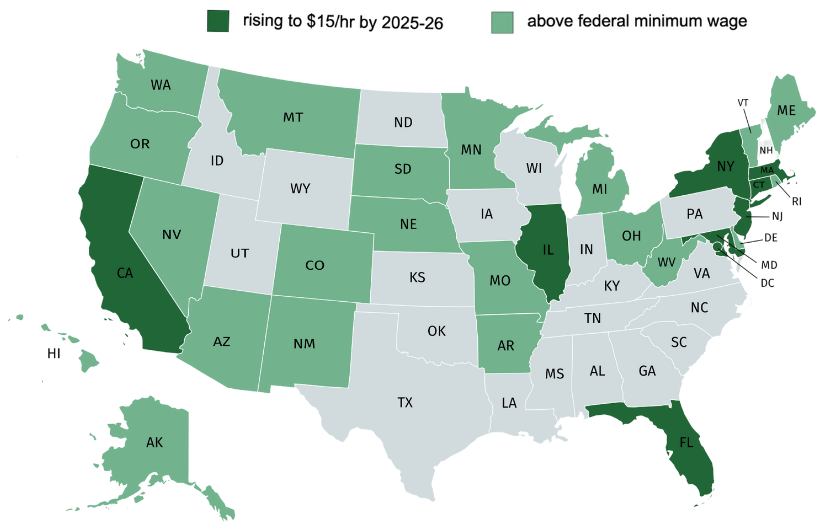People Power Scores Win vs Inequality
Washington – Unless you tuned out Donald Trump on his final frenetic campaign blitz, you remember seeing him barnstorming across Florida, stoking the fears of Latino voters with his nightmare threat that Joe Biden & Company would “turn America into Communist Cuba or Socialist Venezuela.”
Fearmongering pure and simple, but it worked with a big slice of south Florida’s Latino voters, enough for Trump to shrink the normal Democratic majority in heavily Latino Miami and go on to carry Florida, the one big swing state that Trump actually won.
But what is fascinating and telling – especially given Trump’s scary rap against big government – is that close to a million of those same Florida voters rejected Trump’s pro-business economics and voted to amend the Florida constitution to establish a $15 state minimum wage.
Not surprisingly, Trump’s political allies in the Florida Chamber of Commerce fought bitterly against this measure. Chamber President Mark Wilson warned that mandating steady increases in the state’s minimum wage over the next six years would cause “job loss, hurt local businesses, increase the cost of living for seniors, and drive good jobs elsewhere.”

One of many demonstrations for $15 minimum wage in Florida
Source: Fight for $15 Florida Facebook
But a 61% supermajority rejected the self-pleading by restaurant owners and other businesses. In the end, nearly 6.4 million Florida voters — a far bigger majority than Trump’s own majority – supported taking a bold step against income inequality by voting to boost Florida’s current wage floor of $8.56 an hour to $10 next Sept 30, and then add a dollar per year to the hourly minimum until it hits $15 in 2026. After that, the plan calls for an automatic annual cost of living increase.
Pushing for Greater Economic Fairness
One interesting wrinkle is that while the Florida pay hike was of course promoted by organized labor, its chief backer and instigator was an Orlando businessman and attorney named John Morgan, who bankrolled the campaign with more than $5 million of his own money. Why? Because Morgan is convinced that states must take action now to reduce america’s lopsided income inequality and to promote greater economic fairness, for the modern capitalist system to survive.
“What I personally believe the unrest in America is really all about, whether you’re a Bernie bro or a Trump supporter in the Midwest — it’s about income inequality,” says Morgan. “Every great society can crumble because the haves have too much and the have-nots don’t have enough.”
The Florida mandate will in fact reduce the inequality gulf, according to a progressive Florida think tank, the Florida Institute. Its experts calculate that the newly mandated minimum wage increases will bring a rise in pay and living standards for about one-quarter of Florida’s workforce, about 2.5 million people, and it will also help reduce racial and gender pay disparities.
Rallying Cry – “The Fight for $15”
The powerful supermajority vote in Florida is just the latest chapter in the ongoing “Fight for $15,” which broke out eight years ago in cities from New York to Seattle and spread rapidly among restaurant workers and service employees in the retail trade, hotels, and airports around the country.

SeaTac marchers succeeded in passing a $15 minimum wage in 2013.
The campaign’s first political victory was a surprise. It came fast in the tiny airport town of Seatac, which surrounds the Seattle-Tacoma airport and which voted solidly for a $15 wage minimum in November 2013. Seattle quickly followed suit, embracing the $15 minimum wage the following year.neither
But the Powers-that-Be in Washington, D.C. did not take the cue. To the great disappointment of organized labor and other advocates of “Fight for $15,” Congress turned a deaf ear. Republican lawmakers and pro-business conservatives poured cold water on any effort to boost the federal minimum up from the $7.25 an hour level adopted in 2007 and applied in 2009.
Even compromises did not work. When President Obama and Democrats tried a halfway measure – gradually to raise the federal minimum to $10.10 an hour over four years – Senate Republicans killed that effort with a solid party-line vote.
Since then, public opinion surveys have recorded growing support for a big boost in federal minimum wage. Two-thirds of those polled by the Pew Research Center in 2019 declared themselves in favor of hiking the federal minimum wage to $15 an hour. But neither President Trump nor Congressional Republicans were moved by public opinion to take any action.
People Power Takes the Initiative – and Wins
With Washington paralyzed, the states stepped into the power vacuum. In Florida and ten other states, the driving force for fairer pay came not from elected officials and political parties, but from citizen movements that triggered popular referendums on raising the wage floor through ballot initiatives. And these civic action campaigns got results – majority votes for mandatory pay increases even in such conservative states as Alaska, Arkansas, Arizona, Florida, Missouri, Ohio, and South Dakota.

The most ambitious action came in eight states, now including Florida, which set their sights on hitting the magical $15 minimum wage, through a series of incremental annual increases. Those eight states are California, Connecticut, Florida Illinois, Massachusetts, Maryland, New Jersey, and New York, plus Washington, DC, and even though their number is small, they have major economic clout. Collectively, their minimum wage laws cover close to 40% of the total U.S. workforce.
In the past six years, another 21 states have jumped their state minimums above the $7.25 federal level and 15 of them have also instituted automatic escalator clauses that kick in every year to make sure minimum wages rise along with the rising cost of living.
The important message is that ordinary Americans in red states as well as blue states have concluded that action must be taken to reduce what the majority of voters see as unfair economic inequality. Business leaders may object and Washington may remain frozen by partisan gridlock. But despite differences on many other issues, a majority of Americans have demonstrated that they see a compelling need to combat lopsided inequalities in income by rewarding working Americans with more livable wages.
A major test lies ahead for the new Biden Administration. Judging by the opinion polls, a majority of Americans will be looking for the new president to press Congress hard for greater pay equity.


 Hedrick Smith, who conceived this website and is its principal writer and architect, is a Pulitzer Prize-winning former New York Times reporter and Emmy award-winning documentary producer for PBS and PBS FRONTLINE.
Hedrick Smith, who conceived this website and is its principal writer and architect, is a Pulitzer Prize-winning former New York Times reporter and Emmy award-winning documentary producer for PBS and PBS FRONTLINE. 


